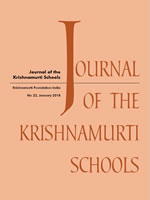Issue 22 - January 2018
- Written by Viju Jaithirtha
The Earth, with its bounty of nature, has its own beauty. Human beings, having evolved relatively recently on this planet, have spread across the earth and bring in their wake great conflict and strife, amongst themselves and with nature.
- Written by Stephen Smith
It is a truism barely contestable that explanations, however clear and rational, lead only to clear and rational outcomes. While these are necessary in the field of knowledge, they remain, at best, a superstructure: they supply the scaffolding but not the building. And, most intimately—and most urgently at this time—it is with the building that we are concerned. We have lived too long on the surface of things.
- Written by Tanushree Borundia
Children observe, learn and ask questions. This way of interacting with the world and with themselves is natural to young minds. The child’s mind is capable of observing and an instinctive search for meaning is evident in the questions they ask.
- Written by Aparna Rajagopal
Living responsibly could mean different things to different people. When I started exploring farming, it brought some very unexpected learnings. Today, growing my own food and living off the grid, has become the core of living responsibly for me.
- Written by V. Arun
First and foremost, nature education at Marudam is a way of life rather than something being learnt as a subject. We are situated in a rural area in Tiruvannamalai, with many of the children’s parents’ lives directly dependent on nature.
- Written by Keerthi Mukunda
We are often asked at our school, Centre for Learning (CFL), how our children will survive in the ‘outside world’, how they will adjust to systems once they graduate, and how they will fare in society—the ‘real’ society.
- Written by Gopal Krishnamurthy
In The Great Derangement, Amitav Ghosh warns of the expansive and devastating impacts of climate change amidst the parching and narrowing of human narratives and imagination. In ‘Rainforest Etiquette in a World Gone Mad’, Suprabha Seshan challenges the boundaries between the human and more than human worlds, and the artificial niceties of inhabiting an increasingly virtual and abstract reality.
- Written by Rupa Suresh
When teachers met during our annual curriculum meeting, I shared an observation of children which we then discussed and looked at carefully: Do teachers feel that children are becoming increasingly uncaring towards the spaces they inhabit, the things they have around them and the people?
- Written by Editors
The moral education of the young is naturally of great concern to teachers, and there is a hoary tradition of using stories and fiction for the purpose of such moral instruction. From the Panchatantra to Aesop, stories have been used to convey simple (some might say simplistic) values and principles, and this has been true to some extent in the modern Indian educational context as well.
- Written by David MacDougall
During the last few years two colleagues and I have conducted a series of video workshops with school children in different parts of India. The workshops were part of a five-year project entitled ‘Childhood and Modernity: Indian Children’s Perspectives’ based at the Australian National University and funded by the Australian Research Council.
- Written by Geetha Waters
Holistic education is a celebration of attention rather than the act of recall. Attention is the vital component in human intelligence. It revitalises interest, is tangible as carrying a sense of vigilance and care, and plays an essential role in all healthy relationships inside and outside the classroom.
- Written by J. Krishnamurti
Have you ever paid any attention to the ringing of the temple bells? Now, what do you listen to? To the notes, or to the silence between the notes? If there were no silence, would there be notes? And if you listened to the silence, would not the notes be more penetrating, of a different quality?
- Written by Jane Sahi
It is not unusual to have worked as a teacher for forty years, but to answer the question of what sustains us as teachers might be very different for each one. It is now more than forty years since I began learning how to teach, and looking back, I wonder what has given me energy through the ups and downs and roundabouts of working in a school.
- Written by Sreelakshmi Sudhakaran
I was nine years old when I first encountered the word ‘empathy’. Born and raised in Dubai, I am an only child brought up by parents who had both come from large, sprawling families back in India. Precocious and fidgety—as a lot of only children are wont to be—I had always been a fast learner, and usually did well in school as far as academics were concerned.
- Written by Akhila Seshadri
Muchiripattanam, or Muchiri or Muziris was, “The city where the beautiful vessels, the masterpieces of the Yavanas [Westerners], stir white foam on the Periyar, river of Kerala, arriving with gold and departing with pepper”(from Akananooru, a collection of Sangam Age Tamil poems).
- Written by Pallavi Phatak
Teaching in a school and being involved in its institutional aspects, studying education formally, working with teachers, and teaching students of education can, ironically, shift one’s certainties about what education of the young should concern itself with.
- Written by Alok Mathur
‘The reflective teacher’ is a phrase that has been much in vogue in education circles for at least the past two decades. At the outset this may evoke a hazy image of a somewhat thoughtful teacher one might be happy to see teaching in our schools.


